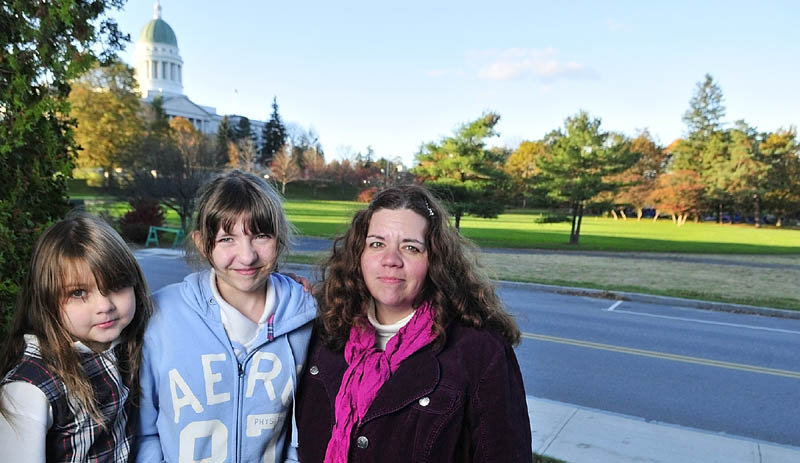AUGUSTA — Having their neighborhood “occupied” is getting a little old for the Rheaume family.
Living in the only remaining residence next to Capitol Park, the Rheaumes are no strangers to protests or other public events next door to their 118-year-old Union Street home.
But the Occupy Augusta protesters are different than most other users of the expansive park across the street from the State House.
When the day ends, they don’t go home. They go into their collection of tents on the grounds, staying through the night and into the next day, as part of their efforts to occupy the park and make sure their populist message is heard.
Marcie Rheaume wonders why requirements for users of the park to get a permit to stay overnight aren’t being enforced.
She worries about the transient nature of the group.
And, because of their constant presence, she is afraid to let her two daughters, ages 6 and 10, out of the house to play in their yard unsupervised.
“I have no problem at all with their politics,” she said. “I just don’t want them in the park unless they have a right to be there. And they don’t have a right to be there, because they don’t have a permit to do so.
“Other groups who go into the park obtain a permit. I’m not quite sure why they don’t have to as well.”
Kim Tripp, of Gardiner, who comes to the Occupy Augusta encampment during the day, said she’s sorry if the group’s presence has bothered the Rheaumes.
But Tripp said the First Amendment right to assemble peaceably and to petition the government for redress of grievances trumps local permit requirements at Capitol Park.
“The Constitution gives us the right,” she said Friday as other group members worked to secure tarps and tents from a growing wind. “That’s our permit.
“The founding fathers were very thoughtful in making sure we have the right to redress grievances with our government.”
Capitol Police Chief Russell Gauvin confirmed that Occupy Augusta group members are indeed committing a civil violation by camping in the state-owned park without a permit.
But he said his agency is trying to strike a balance between enforcing that civil violation and the people’s right to protest and be heard by their government.
Gauvin said whether to allow the occupation to continue is something the department assesses every day.
“So far, they have been very respectful of the property and not causing damage,” he said. “That weighs heavily in us deciding how that balance, between the civil violation and people’s rights to be heard, falls.
“If, say, they were damaging trees or causing other issues, that balance could shift toward enforcing the civil violations.”
Rheaume said the occupiers have been noisy, sometimes drumming.
Sound carries across the park into their home and her family can hear the group at night, she said. Laughter and other sounds from the park kept her family up past midnight last Saturday, she said.
Tripp speculated that some of the noise Saturday was from passing motorists, some of whom drove by and yelled at the group.
She also suggested that Rheaume come talk to them if there are problems.
“Walk across the park and talk to the folks here,” she said. “It’s a great group of people. If it has been too noisy, I apologize. We don’t want to be bad neighbors.”
She said the group’s message against the influence of money in government is too important not to be heard.
Tanisha Lowell, of Unity, said most participants were in bed by 10 or 11 on the nights she stayed in the encampment.
She acknowledged that on weekends, their ranks increase and things could be noisier than normal. She said if a neighbor asked them to quiet down, they would respect that request.
Rheaume said she doesn’t feel safe approaching the group’s members, nor having them so close to her yard.
“I don’t know who these people are,” she said. “I totally respect their right to protest. My father is a veteran, he served to protect this country and our right to protest.
“But some of those people look scary, rather ragged. I suppose I would, too, if I’d lived in a park for two weeks with no running water.”
Gauvin noted that groups staying at the park overnight doesn’t occur often, but is not unprecedented. He said Civil War re-enactors have camped out at the park and had campfires.
In the 1990s, state workers protesting furlough days camped out in the park.
Gauvin said he’s gotten some positive comments about Capitol Police’s handling of the situation, as well as about a half-dozen complaints they should enforce the permit requirement.
“The way I look at it, it’s not special treatment,” he said of officials’ decision to not enforce the permit requirement. “They’re exercising their right to protest against their government. When that occurs, government needs to accommodate that.
“That’s part of what makes us different from other countries.”
Keith Edwards — 621-5647
kedwards@centralmaine.com
Send questions/comments to the editors.




Comments are no longer available on this story